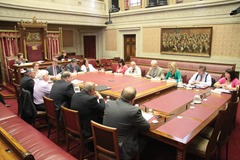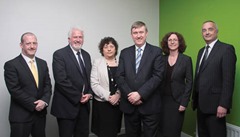Education Committee: a progress report
 A less combative atmosphere has allowed the Education Committee to make more progress since the 2011 election. agendaNi profiles its work.
A less combative atmosphere has allowed the Education Committee to make more progress since the 2011 election. agendaNi profiles its work.
Education remains one of the more contentious issues on Stormont agenda although there is more consensus in this Assembly compared to the last mandate.
In the 2007-2011 Assembly, the Education Committee’s work was dominated by the conflict with the Minister (Caitríona Ruane) and it produced only two substantive reports in four years. The current committee has made a good start by publishing two reports to date.
The committee is chaired by DUP education spokesman Mervyn Storey who has held the post since June 2008. Northern Ireland is the only part of the British Isles where party spokesmen regularly chair legislative committees. This means that the chairman usually delivers two speeches in an Assembly debate: a nuanced summary of the committee’s position followed by a more forthright party political speech. The latter speech can potentially contradict the previous one.
The Assembly parties defend the combining of the two roles. In their view, the Chairman is the most informed member of the committee and therefore will also be (on merit) the best party spokesman.
The deputy chair is Danny Kinahan, the UUP’s education spokesman. Likewise, the committee also includes the spokesmen for Sinn Féin, the SDLP and the Alliance Party: Chris Hazzard, Seán Rogers and Trevor Lunn.
The other six members are Jonathan Craig, Stephen Moutray and Robin Newton (DUP), Pat Sheehan and Michaela Boyle (Sinn Féin) and Jo-Anne Dobson (UUP).
Seán Rogers is the only member who has worked as a teacher although several other members serve as school governors. Two former DUP members, Brenda Hale and Michelle McIlveen, worked as a classroom assistant and a teacher respectively but were moved from the committee in a reshuffle in September.
A DUP spokesman declined to give a reason for the move but said that all members “have different areas of expertise” and the new members would “bring fresh ideas and a new perspective to the scrutiny of policy, which is the role of a committee.”
As expected, the representatives of the Minister’s party will defend his or her line in the committee. They also have more freedom to express the party’s ideal position, as opposed to the position that a Minister may take due to a constrained budget.
This sometimes leads to Sinn Féin spokesman Chris Hazzard asking for Minister John O’Dowd to take action, although in reality they work closely together. On 16 September, he called on the Minister to consider extending free school meals to all schoolchildren. Pressed on this, Sinn Féin said that Hazzard was “wholly entitled” to call for an extension of the scheme as he was “a public representative with responsibility for education”.
 The committee’s clerk is Peter McCallion, who was clerk to the Social Development Committee in the last Assembly.
The committee’s clerk is Peter McCallion, who was clerk to the Social Development Committee in the last Assembly.
School council inquiry
The current committee’s first report (June 2012) focused on school councils. These are formal groups of pupils within a school who are elected by their peers to represent them. The inquiry found that councils may not always be the best method to encourage pupil participation, particularly in small schools.
School councils should be supported by a “dedicated and enthusiastic” staff member. Members warned against a “popular pupil only syndrome” and said that pupils of all abilities should be encouraged to participate through a rotating membership. The inquiry involved focus groups of schoolchildren whose drawings were included in the final report.
Education Bill scrutiny
Members protested about the department’s refusal to provide extra information during its scrutiny of the Education Bill. Its report was published in April 2013.
The Bill’s heads of agreement contained a contradiction between the ESA being the “single employing authority for all staff” and governors having the continued power to “employ and dismiss members of staff”. The committee wrote to the Minister three times for amendments to resolve the contradiction but none were received.
The report’s proposals included rural proofing of area plans, a study on how educational value is added by schools, and more emphasis on cross-community sharing of resources.
Members could not agree on whether voluntary grammar schools should have their own sectoral body. The DUP opposed duties to promote Irish medium and integrated education, claiming that this put controlled schools at a disadvantage; the duties were defended by nationalists and Alliance.
Policy reviews
The Education Minister can request the committee’s “considered view” on departmental strategies or independent policy reviews. The committee then discusses the relevant document, asks stakeholders for their views.
Earlier this year, the department proposed several short-term changes to A-levels e.g. moving all exams to June and limiting the number of re-sits. The committee only gave a cautious welcome to the plans but supported the concept of involving universities in the drawing up of A-levels.
On the draft early years strategy (Learning to Learn), members welcomed the extension of the foundation stage to include a non-compulsory pre-school year. Consultations on the strategy have been taking place since June 2010.
When considering the common funding scheme review, members defended the existence of small schools, and also called for more funding for early years education and primary schools.
New inquiry
The committee’s new inquiry into the Education and Training Inspectorate (ETI) is due to report back to the Assembly by January 2014. The main terms of reference are to review the effectiveness of ETI’s current approach to school inspection and improvement; identify the “key issues impacting on” under-performing schools; and identify and analyse alternative approaches and models of good practice.
The deadline for written responses was 27 September 2013 and oral evidence will be taken in October.





